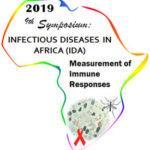Malaria has a higher morbidity that HIV and TB combined. Though curable it does cause complications in children and pregnant women. This year we had two talks on Malaria research, one that focuses on understanding immune responses associated with repeated malaria infections, and the other on malaria vaccinology titled “Vaccine-Induced Antibody-Mediated Immunity Against Malaria” that was presented by Simon Draper from Oxford University. He began his talk by introducing the malaria life cycle and the different Plasmodium species. Plasmodium sp. is a very complex organism, and in the case of P.falciparum has approximately 5000 genes that are involved in transmission (Draper et al., 2018). Draper also highlighted some of the major underlying immunological and molecular mechanisms of protection. Draper also spoke about some of the reasons why there’s no vaccine:
- Polymorphic and redundant antigens
- Lack of in-vitro correlate of in vivo protection
- Very high antibody concentration needed to protect
- How to maintain longevity to protection
- Two plasmodium species – falciparum (Sub-Saharan Africa) and vivax (Asia)
He also provided an overview of the human challenge model of malaria infection known as controlled human malaria infection (CHMI). This model is vital to the field of vaccine research for malaria. It has been so valuable to the malaria vaccine pipeline, that other infectious diseases fields such as Tuberculosis are trying to create their own. An effective and ideal vaccine against malaria, should induce immune response against the several stages of the malaria life cycle.
The most advance malaria vaccine is RTS,S , -which prevents the sporozoites from entering the- and is currently in phase 3 clinical trials. This vaccine has been shown to have moderate efficacy during the first year post vaccination. However, vaccine-induced Ab responses have a short half-life and has been demonstrated in some cases to shift from an efficacy of 30 to 15 %.
Lastly Draper, also discussed RH5-based vaccines as a candidate anti-malarial vaccine. RH5 is a highly conserved protein that expressed during P.falciparum blood stage, specifically RH5 interacts with Basigin – Block interaction that leads to integration into the RBC’s. However, since RH5 is only expressed by P.falciparum vaccine induced immunity will not be species cross-reactive. RH5 has been shown to be highly susceptible to RH5-based vaccine induced broadly-neutralising polyclonal antibodies (Douglas et al., 2011). Additionally, RH5-based vaccine has been shown to be efficacious in Aotus monkeys (Douglas et al., 2015).
Article by Lusako Sibale, Mishka Danielle Muthen and Upsana Ramphal
